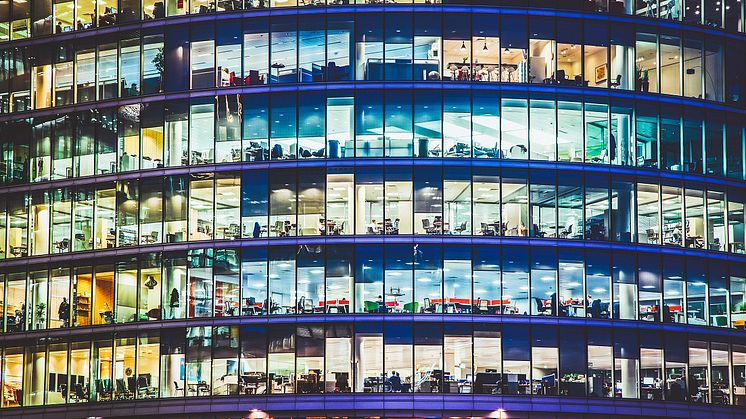
Press release -
Hybrid Working: A Matter of Reputation?
Koen Mattjis, Chief Division Officer, Operate & Manage Division of the Nemetschek Group, discusses the importance of hybrid and flexible work scenarios for employees – and employers
18 months into the COVID-19 pandemic and with the hope of a return to normalcy in the near future, companies are starting to shift from seeking COVID-19 office solutions to thinking strategically about the office of the future. Many employees are voicing an interest in working remote for at least part of their time, so companies are assessing how to best prepare for these changing workplace needs. And this is a necessity, as studies show: C-Levels expect the typical employee to be back in the office almost full time. But nearly three-quarters of all questioned employees would like to work remotely for two or more days per week. There seems to be a discrepancy in expectations. How can employers make sure their teams enjoy coming back to the office? Where’s the perfect balance and how can both sides benefit?
Working from home, or from another place than the office space, is no longer a “luxury good” but something companies and organizations need to offer nowadays. A home office comes with many advantages: employees save time and money because of not having to commute to the office, they can work from wherever suits best and seem to have a higher productivity overall. It also increases workplace security – especially in times of a pandemic. Those arguments also attract new employees. And the reverse is also true – companies can reach out to a broader talent pool if not limited to a certain location. Quite an advantage, especially in times where there is a war for talent.
One of the conclusions that many companies have drawn from the pandemic is that focused work can, for many employees, be done just as well – if not better – from home as in the office. Many types of collaboration and socialization, on the other hand, are better suited to face-to-face interactions, particularly when they involve new employees. As a result, many companies expect to dramatically increase the availability of conference rooms, huddle areas, and other collaboration or flexible spaces to accommodate new ways of working.
So, this seems like the perfect timing to put the current office setup on the test – is it still suitable? Does it fit the existing as well as the new needs for collaboration, focused work, and team building? Yet people will want to go to the office for certain days. Studies show certain fatigue and stress symptoms caused by an overload of online meetings and the feeling of a disorganized way of working from home – undermining the home-office-productivity effect. Another disadvantage of working permanently from home is the missing social interaction at work with colleagues. A coffee, a chat, or a lunch together – things that were quite normal before COVID-19 – are now rare situations of social exchange. The result is that people might feel isolated and lonely. These symptoms occur increasingly with and are particularly relevant for new colleagues. Not being able to meet in person and to only get in touch virtually makes it significantly more difficult to network. Another negative consequence of working fully remotely is – especially in bigger cities – a lack of a real workspace in the employee’s housing. Often, rents are high, so it is difficult to find an apartment or house that offers a designated working area.
The much-discussed hybrid workplaces combine the best of both worlds. The term describes an office concept that enables employees in the office as well as remotely. Beyond the obvious challenge of determining how much space is needed, another question is what kind of space employees will require when they come to the office so that they can make the most of their in-office experience.
This is where software tools come into play. They can help to predict and handle those uncertainties and monitor precisely which space is being used and how. As a consequence, space can be optimized to adjust to the new way of hybrid working. Firstly, empty, wasted space can be reduced and areas of collaboration increased. Secondly, the need to account for and engage employees who are at the office increases the importance of reservations as a tool for connecting people. Reservation data can be used as the basis of a people finder feature in workplace apps that makes it easy to identify who is in the office and where they are sitting – all without tracking employee movements. Finally, there are likely to remain some employee sensitivities around safety at the office for some time, even after the pandemic. Measuring and sharing information about crowdedness and air quality in the office using live data can be a valuable complement to reservations systems for example, helping employees choose spaces in areas that are occupied to a level they are comfortable with.
Flexible work concepts are not new, but many organizations are embracing them for the first time and need to put in place robust reservations systems and, ideally, even sensors to make them work well. A well-functioning flexible concept can dramatically improve workplace perception and performance, but the pandemic also has proven that many offices suffer from poor implementation.
This leads to a better way of managing office space. And to a significant reduction of energy consumption: With the help of data – and the right software tools, facility and space managers can cut down the use of electricity, heating, or air conditioning – simply because they know, which office areas are used, and which ones are left empty. This also decreases the carbon footprint of companies and the office space and helps fighting climate change.
The pandemic has proven that flexible office solutions such as hybrid working are a viable alternative to the old way of working five days a week from the office. In a post-pandemic world, these concepts can be thought through – not only to match with the employees’ needs for a more flexible working environment, but also to face the challenge of unused office space, high rents, and ongoing operational expenses. With the right software tools, sensor data, storage, and interpretation, managing a hybrid workplace is no longer a headache for executives and facility managers, but a new innovative step into the future – and into the new normal way of working, that fits both the employer’s and the employees’ needs. Hybrid working and flexibility have long since ceased to be luxury goods on the labor market, but rather a real matter of reputation.
Related links
Topics
Categories
About the Nemetschek Group
The Nemetschek Group is a pioneer for digital transformation in the AEC/O industry. With its intelligent software solutions, it covers the entire lifecycle of building and infrastructure projects and guides its customers into the future of digitalization. As one of the leading corporate groups worldwide in this sector, the Nemetschek Group increases quality in the building process and improves the digital workflow of all those involved in the building process. Customers can design, build and manage buildings more efficiently, sustainably and resource-saving. The focus is on the use of open standards (OPEN BIM). The portfolio also includes digital solutions for visualization, 3D modeling, and animation. The innovative products of the 15 brands of the Nemetschek Group in the four customer-oriented segments are used by approximately six million users worldwide. Founded by Prof. Georg Nemetschek in 1963, the Nemetschek Group today employs more than 3,000 experts.
Publicly listed since 1999 and quoted on the MDAX and TecDAX, the company achieved revenue amounting to EUR 596.9 million and an EBITDA of EUR 172.3 million in 2020.

